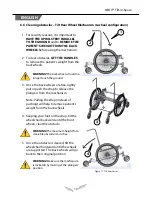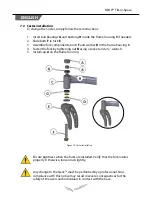
5
Revision 3
Janvier 2015
Owners manual
ENGLISH
2. Specifications
A Back height
12" to 25"
B Seat depth
14" to 22" (± 1" adjustable)
C Seat width
Small frame 14" to 19" / Extended frame 19" to 22" / HD frame 20" to 26"
D Seat to floor height
13" to 20"
E Overall length
42"
F
Overall width
+8" to +12" based on option chosen
G Rear wheel diameter
12", 16", 20", 22", 24"
H Front wheel diameter
5", 6", 8"
I
Transport weight*
Neox 4 wheels: 50.8 lb Neox 6 wheels: 55.8 lb
J
Maximum load
250 lb / 350 lb
Back angle
85° to 115°, (5° increments)
Gas recline back
max 130°
Tilt**
(-) 5° to 45°
Armrest :
« U » Type
7" to 12"
« U » Type lowered
6" to 9"
Footrest :
60° - 70° - 90° (foldable & adjustable in height by 5" )
Legrest :
elevating/articulating legrest
Table 1 : Specifications
*Weight based on 16” x 16” wheelchair with all standard components except for rear wheels. Rear wheels
are excluded since there are multiple different weights for possible wheel configurations. Example, a pair
of standard 22” rear wheels weighs 7.8 lb.
** Refer to Appendix A for limitation table.






































